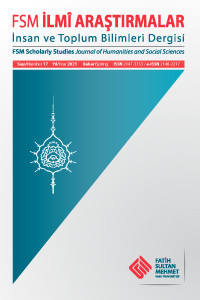Kerimcan’ın “Bireyleşme” Yolculuğu Bağlamında Devlet Ana Romanında Arketipler
Jung psikolojisinde “bireyleşme” tek, homojen bir varlık olmayı, kişinin kendisinitamamlamasını ifade eder. “Kendini gerçekleştirme” denen bu serüven, ben-merkezli yada bireyci olmak, kolektif sorumluluklarına karşıt davranmak anlamına gelmez. Tersinebu kavram, toplumla ilişki içerisindeki bireyin ona karşı görevlerini de yerine getirerekkendi kimliğini oluşturmasıdır. Yani “bireyleşme”, bireyin yaptığı tercihlerle kendi varoluşunutamamlaması anlamına gelir.Bu çalışmada Kemal Tahir’in Devlet Ana romanının kahramanlarından Kerimcan’ın,“bireyleşme” yolculuğu üzerinde durulmuştur. Kerimcan’ın tercihleri neticesinde ulaştığıbireyleşme süreci, Jung’un “bireyleşme yolculuğu” üzerine yaptığı çalışmalarından hareketleele alınmıştır. Çalışmada Jung’un “aşama/ben” arketipi başta olmak üzere işaretettiği arketipler üzerinde durulmuş; böylece 13. yy Osmanlı toplumunda kolektif zorunluluklarınbireyleşme yolculuğu üzerinde oldukça etkili olduğu ancak bireyin kendinigerçekleştirmesine engel olmadığı sonucuna varılmıştır.
Anahtar Kelimeler:
Bireyleşme, Kerimcan, Devlet Ana, arketipler
The Archetypes in the Novel Devlet Ana within the Context of Kerimcan’s Journey of Individuation
In the psychology of Jung, the concept of individuation refers to being a homogenousentity, the self-completion of the individuals’. This adventure called as “self-realization”is not equivalent to being self-centered, individualistic or acting opposite to the collectiveresponsibilities. Rather, this concept means to the creation of the individuals’ own identities,by also fulfilling their duties towards the society. In other words, individuation refersto the formation of individuals’ their existence by their own choices.In this study, the individuation journey of the main character in Kemal Tahir’s novelDevlet Ana is examined. The individuation journey of Kerimcan that was shaped throughhis own choices is under debate by focusing on the Jung’s works about ‘the journey of individuation’.The archetypes that was pointed by Jung, especially ‘The Self’ archetype isalso examined. Therefore, this study concludes that although collective obligations in theOttoman society of the 13th century had a great influence on the process of individuation,these obligations never hindered the individuals in their self-realization.
Keywords:
Individuation, Kerimcan, Devlet Ana, archetypes,
___
- Araz, Rıfat, “Eski Türk Destanlarında ve Türk Şiirinde Öne Çıkan Tipler”,
- Bizim Külliye, sayı 27, Mart- Nisan-Mayıs 2006.
- ISSN: 2147-3153
- Başlangıç: 2012
- Yayıncı: Fatih Sultan Mehmet Vakıf Üniversitesi
Sayıdaki Diğer Makaleler
Kerimcan’ın “Bireyleşme” Yolculuğu Bağlamında Devlet Ana Romanında Arketipler
Sanatta Gelenek-Gelenekte Sanat Sempozyumu
Târîh-i Behiştî: Vâridât-ı Sübhânî ve Fütûhât-ı Osmânî
Mehmet Samsakçı, Ölüme Açılan Estetik Kapı: Türk Mezar Taşı Edebiyatı
Ali Bulut, Belâgat: Meânî – Beyân – Bedîʻ
Surinder S. Jodhka, Caste / Kast Sistemi
Hatîb el-Bağdâdî, El-Kifaye Fî Ma’rifeti İlmi Usuli’r-Rivaye
